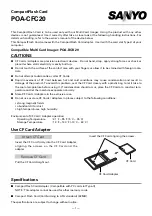
7
Grounding Cautions (
Continued) …………..
5.)
DON’T use power tools
to install the nuts for the grounding kit. HAND TIGHTEN ONLY. If you
attempt to 'spin' the ground bolt, the serrated teeth under the head of the bolt might strip the thin
conductive layer.
NOTE:
If benches are moved to another location, the ground bolts in the worksurfaces should be
re-tested. Refer to EOS/ESD document S4.1-1990 Worksurfaces-Resistive Characterization for
proper testing methods. If ground has been disturbed between the bolt and the static dissipative
laminate, DO NOT OVER TIGHTEN ground bolts to achieve proper ground. If ground cannot be re-
established, loosen nuts underneath bolt and remove ground bolt from hole. It may be necessary to
hold the threads of the bolt with a small screwdriver in order to stabilize it to remove the nuts.
Paint a thin layer of CONDUCTIVE ADHESIVE or CONDUCTIVE PAINT on the small "ledge" of
conductive laminate where the bolt head rests and underneath THE HEAD of the ground bolt. Set
bolt back into the hole while liquid is still wet and test ground immediately. At the point ground is
reestablished, let the liquid dry before reattaching the ground wire.
CLEANING:
Hard surface laminate is designed to resist abrasion, scuffing, scorching, hot solder, flux and most
solvents. Intense exposure, such as from a hot soldering iron is not recommended. The surface
cleans easily with a damp cloth and soapy water. A mild chemical cleaner with no abrasive can be
used for stubborn spots. Remove glue and grease with a non flammable adhesive solvent such as
3M Scotch-Grip Solvent No. 4-F. Stains can be removed with a two minute exposure to a 5% hypo
chloride bleach solution, followed by a clean water rinse. Never wax surface, as waxes may insulate.








































